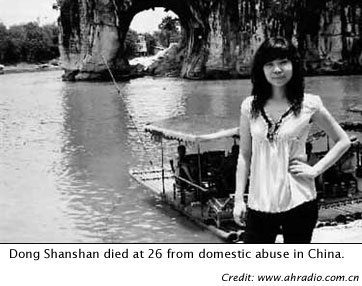
SHENZHEN, China (WOMENSENEWS)–When other brides would have been enjoying their honeymoons, Dong Shanshan was calling the police.
In the next 10 months, her calls became more and more desperate as her husband, Wang Guangyu, repeatedly beat her till she passed out and kidnapped her when she escaped. Her eight calls to the police did nothing. They declined to intervene in the affairs of a married couple.
It wasn’t until Dong was lying on her deathbed with a belly swollen from hemorrhage that the police were ready to listen to her account. By then, it was too late.
Dong’s story, widely reported in late 2010, became a catalyst for national legislation on domestic violence in China. On July 14 The National People’s Congress Standing Committee included an anti-domestic violence law in its legislative agenda. This followed four years of urging by the All China Women’s Federation, the government agency in charge of women’s affairs.
The new legislation, if passed, will provide a clear definition of domestic violence, including physical, mental and sexual abuse. It will also specify punishments. Existing laws prohibit domestic violence but only in vague terms.
Lv Xiaoquan is research director at the Center for Women’s Law Studies and Legal Services of Peking University, a nonprofit organization providing legal aid to women.
"Dong’s case revealed so many hidden problems about domestic violence in China," he says. "The biggest question is the police: Should they intervene in violence in the family, and how?"
He adds that the new law will only be effective if those executing it truly understand the severity of violence against women.
A third of Chinese families suffer from domestic violence, according to a survey by the All China Women’s Federation in 2007, but few victims find protection from the law.
Most Lawsuits Fail
A 2010 study by the Shenzhen Intermediate Court found three-quarters of domestic violence lawsuits fail in court. Most cases fall apart because of insufficient evidence, says Lai, a judge at Shenzhen Intermediate Court who declined to provide a first name.
"Many victims don’t save the evidence or call the police in time, which makes it difficult to differentiate domestic violence from normal family quarrel," Lai says.
But Lv, who has represented victims in lawsuits, argues that the court puts too much burden of proof on the plaintiff. The court requires victims to show police records of violence and medical records proving abuse-related harm. As a matter of practice, most police records simply say "family conflict, reconciled" without any mention of the violence committed, Lv says. Others tend to be a one-sided record of the victim’s story without any input from the spouse, which disqualifies them as evidence.
As a result, many victims turn elsewhere for help; sometimes to the local Women’s Federation or the employer of their abusive spouse. Some resort to violence against their abusers.
Even in a successful lawsuit, victims have a slim chance of getting any compensation. The country’s marriage law stipulates victims of domestic violence can get more property in a divorce. But most victims only get a one-time payment of their medical bills or a mental-damage compensation of around $1,500, says Tuo Hongmei, a lawyer at Guanghe Law Firm in Shenzhen.
"Most judges will automatically go for 50-50 in property division for fear of complaints," Tuo says. "Clients are already lucky to get a divorce."
Victims Inhibited
The grim economic prospect after a divorce inhibits victims from seeking help, especially in big cities where jobs are tight and living expenses are high, says Li Xiaofeng, a sociologist at Shenzhen University. The national inflation rate is expected to hit 5 percent this year, and prices of oil and pork are soaring.
"Many victims are housewives without any job skills," Li says. "Without economic independence, their hardship will continue after divorce."
Peking University’s Lv says raising awareness among judges must go hand-in-hand with the legislation. He had a successful case this year where his client got about $8,000 for mental-damage compensation, a rare sum among domestic violence cases. The key, he says, was a sympathetic female judge.
"Of course we want judges to be fair," Lv says. "But judges with a gender consciousness tend to do more justice in these cases."
In 2010, after the high-profile death of Dong, the Center for Women’s Law Studies and Legal Services started projects in Hu’nan and Yunnan provinces to educate judges and the police about domestic violence. The government needs to step in and spread the training across the country, Lv says.
"Dong’s tragic death shocked the police as well," he says. "She was a victim herself, but hopefully her tragedy will bring some real progress."
Would you like to Comment but not sure how? Visit our help page at https://womensenews.org/help-making-comments-womens-enews-stories.
Would you like to Send Along a Link of This Story?
https://womensenews.org/story/domestic-violence/110802/brides-death-in-china-spurs-anti-violence-bill
Jia You, currently reporting from China, is a rising sophomore at the Medill School of Journalism at Northwestern University.
For more information:
"Critics call for more protection following bride’s beating death," China Daily:
http://www.chinadaily.com.cn/cndy/2010-11/24/content_11599179.htm


